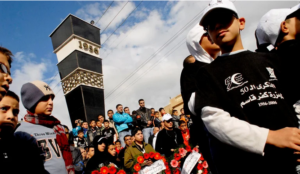Israelis refuse to be haunted by the ghosts of massacres past. What does it mean for the future?

A memorial ceremony marking the 50th anniversary of the Kafr Qasem massacre
Gideon Levy writes in Haaretz on 3 August 2022:
Making a bomb out of a molehill. Not the bomb we should have wished for, but a much more dangerous one – the release of the Kafr Qasem transcripts didn’t even raise an eyebrow. The media, except for Haaretz, barely commented, the public yawned, the matter is dead. It happens time after time: The soldiers’ organizations move heaven and earth, the military censor bans and then all that can be heard is a yawn. The yawn is still the good part: The publishing house of the dark past arouses for many feelings of pride and support, or sadly ridiculous statements of a lack of other choices. War, you know.
The procedure repeats itself: Tantura or Kafr Qasem, the killing of prisoners in 1967 or the massacre in Lod in 1948, Jenin, Jenin or the killing of the teens on the Gaza beach – nothing cracks the feeling of total justness of the Israelis, or at least their self-righteousness, the Zionist left the same as the right. Over the past few weeks, they were once again Tantura and Kafr Qasem. Even if it was still possible to argue about Tantura, for Kafr Qasem the documents resolved the truth that should have resounded. If at Tantura it was still possible to blame everything on Teddy Katz and Alon Schwarz, the researcher and the film’s director, at Kafr Qasem the official truth was exposed, razor-sharp and painful.
For whom, exactly? The Arabs knew the truth all these years, and for them there was no news in the publication of the documents and also no belated comfort. The Jews didn’t want to know all these years and do not want to know even after it is hurled in their faces. It was also possible to trust the Israeli media that it would once again know how to pamper its consumers in hiding and obscuring the truth. What do we need Kafr Qasem for now?
Maybe it is somehow possible to understand the diversion of our gaze from the stains of the heroic past as they were told to us, but this past has not ended, nor have the denial and the mendacious excuses. Anyone who was not moved by the revelations of Kafr Qasem is also not moved by the kicking of a 15-year-old protester in al-Mughayyir, 66 years later. That is why the ignoring of Kafr Qasem is so serious.
The massacre of Israeli citizens, after the establishment of the state, before a war and not in the midst of it – for which no one was punished seriously, no one accepted responsibility, no one thought to offer reparations and only a few were willing to apologize – does not arouse even moral discomfort. The killing of innocent people, whose children are here among us, does not interest us, the superior Israeli Jews. We grieve only our own dead, and we grieve a lot. In the Jewish state only what happens to the Jews is considered important.
Even now, not everything has been released for publication: The infamous Hafarperet (“Mole”) plan is still sealed. Why? Its publication is also a “security risk.” The enemy will know, the winds will howl. So, dear censors, remove all worry from your hearts, even the warriors of the past can sleep in peace. Their good name will never be stained. No one in Israel will get upset over a fiendish plan to expel Arab Israelis. Everything may be published. With the exception of a few starry-eyed leftists, no one will lose any sleep over it. Permit the publication of Hafarperet and all the other disturbing truths. No stain from the country’s past can darken the Israeli sense of satisfaction, which has no boundaries.
There was a transfer plan in 1956? Many Israelis lament that it was not implemented. It’s too late? Not necessarily. How many Israelis would get upset today about a population transfer under the auspices of the next war? You need to find the appropriate moment, the proper darkness and the right excuse – and it could very well happen. After that we can rely on the media: They will conceal it from public awareness this time too.
Anyone who does not get upset about the revelations of the past also does not get upset about what is happening in the present, and will not lift a finger in the face of what could well happen in the future. The fears of Israeli Arabs of another transfer have not only not abated since Tantura, they have only strengthened, and justifiably. The absolute Israeli apathy to the shadows of the past plays a significant part in fanning this paralyzing fear.
This article is reproduced in its entirety
